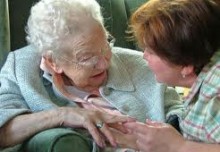 I attended a medical visit along with one of my clients recently, and he was presented with a document on his rights and responsibilities as a patient. As geriatric care managers and care professionals, we often accompany our clients to a doctor’s office visit so that we can help ask the questions a patient may not consider and assure that the patient understands all the provider’s explanations. Some organizations these days call them their “patient’s bill of rights,” and they typically contain all the usual information on how they promise to safeguard a patient’s privacy and the confidentiality of their records.
I attended a medical visit along with one of my clients recently, and he was presented with a document on his rights and responsibilities as a patient. As geriatric care managers and care professionals, we often accompany our clients to a doctor’s office visit so that we can help ask the questions a patient may not consider and assure that the patient understands all the provider’s explanations. Some organizations these days call them their “patient’s bill of rights,” and they typically contain all the usual information on how they promise to safeguard a patient’s privacy and the confidentiality of their records.
This particular document spelled out some of the patient’s responsibilities, such as asking questions if they don’t understand something. But it also stated that the patient is responsible for taking an active role in their medical treatment and following the instructions offered by the provider. I thought to myself, “You mean like taking the medication that is prescribed for the patient’s condition?” Well, it turns out that failure to comply with prescription instruction is a really big problem; in fact, it is referred to by policy folks as American’s “other drug problem.” Did you know that:
- more than half of 65+ year olds take five or more meds routinely
- about 25% take between 10 and 19 pills each day
- nearly 60% in a recent survey admit that they miss doses
- among those on five or more meds, the percentage missing doses is 63%.
The economic impact of all this non-adherence is estimated to be $100 billion annually. Non-compliance also is the cause for 125,000 deaths in America annually and $290 billion in emergency room visits and other avoidable medical expenditures. Non-compliance also is the root cause for an estimated 23% of nursing home admissions (estimated to cost $31 billion) and 10% of admissions to hospitals (estimated at $15 billion).
The cause can be just plain forgetfulness or cognitive shortcomings like dementia or Alzheimer’s. Some older adults still choose between food and medicines if they are on limited means. If you are a caregiver to an older loved one, you can help improve their compliance and here’s how:
- Communication: If an older adult understands the severity of their condition, they are more likely to be compliant; help to ensure the provider explains this.
- Participation: Patients are more likely to be compliant with a regimen if they are engaged as partners in their own care; empower your older loved one.
- Pharmacists: It can be easier to order prescriptions by mail, but the engagement with a pharmacist can be very helpful in reinforcing what a provider has said.
- Support: There are groups of people with like conditions that can meet and support one another’s compliant behavior; birds of a flock feather together.
- Memory Aids: There are more than day of the week pill boxes available; some dispensers are computerized to help track missed doses and avoid over doses.
All of this reinforces medication adherence, but also remember that as a caregiver you should be on the lookout for drug-drug interactions, some of which can make adherence difficult. Tell the provider if you see new behaviors or symptoms as soon as you notice.
Charlotte Bishop is founder of Creative Care Management, certified professionals and geriatric care managers who are advocates, resources, counselors and friends to older adults and their families in metropolitan Chicago. Please email your questions to info@creativecaremanagement.com.




